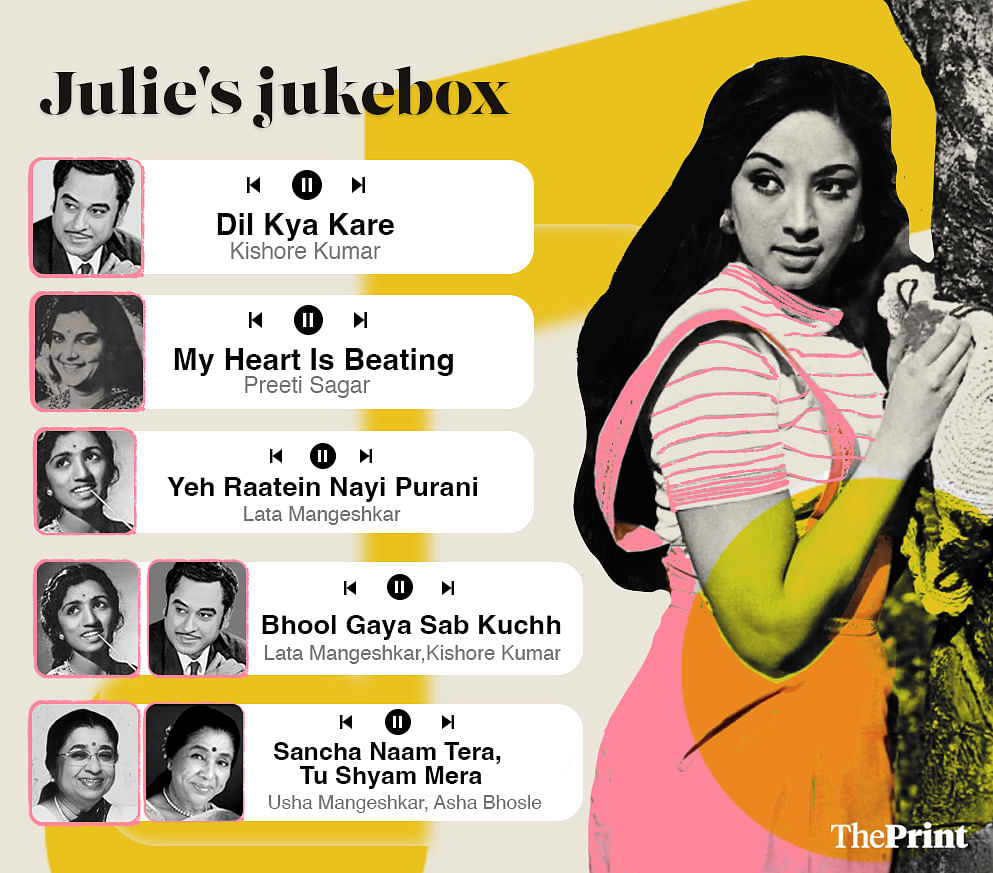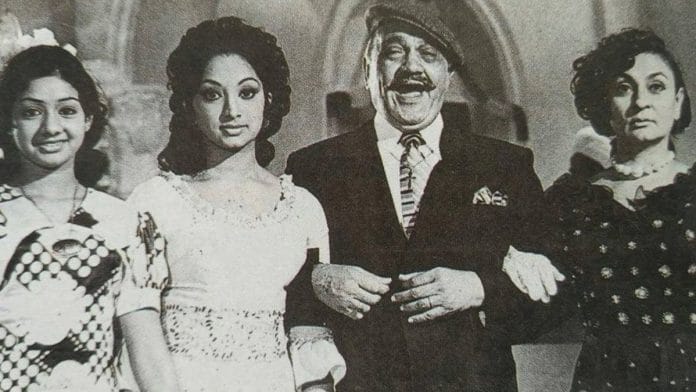The year 1975 was when Bollywood experimented across genres, formats, and technology. It was the year of Sholay, Aandhi, Deewar, Mili, Jai Santoshi Maa, Mausam, Choti Si Baat and Julie. From one-hit wonders like Julie’s Vikram Makandar and Jai Santoshi Maa’s Kanan Kaushal to established stars like Amitabh Bachchan, everyone found a place at the box office.
KS Sethumadhavan’s Julie—a remake of his Malayalam blockbuster Chattakkari (1974)—gets lost in the crowd, but it was memorable for many reasons. For one, it featured the first English song in a Hindi film, My Heart is Beating. It was one of the earliest portrayals of an Anglo-Indian family in Hindi cinema. It was South Indian star Lakshmi’s Bollywood debut; she was reprising her role as Julie from Chattakkari. Julie was also one of Sridevi’s first roles in Hindi cinema; she played the protagonist’s younger sister, Irene. And finally, it tackled the stigma of pregnancy outside of marriage and inter-religious relationships.
The plot is simple—Julie falls in love with her friend (Rita Bhaduri)’s brother Shashi (Vikram Makandar) and becomes pregnant. But her lover has already left to pursue a career in a different city. While her mother proposes abortion, a religious aunt discourages her. She is sent away to have her baby in secret. The issue of inter-religious marriage crops up when Julie has to give up her child for adoption to escape the social stigma attached to unwed motherhood.
What stands out the most in Julie is the music. Music director Rajesh Roshan reportedly created the song Dil Kya Kare in 10 minutes. And Kishore Kumar was at his magical best. It became one of the most popular songs of the year. Roshan also won the Filmfare Award for Best Music Director for the film. It remains one of the top 10 tracks he created. Lakshmi, too, won the Filmfare Award for Best Actor that year.

Laden with stereotypes
Even though the larger theme of the movie is critical of a regressive society with a Victorian-era hangover, Julie gives in to stereotypes. It’s an industry-wide problem.
Heavy-handed stereotypes have been in Bollywood ever since its inception, be it of gender, class, community or religion. Muslims with kohl-rimmed eyes, wearing colourful shararas and achkans, eating paan were once the staple. Even in Amar Akbar Anthony (1977), Rishi Kapoor, who played Akbar, dressed in a shiny green achkan, with a matching cap, and a colourful vest. Christian men have been caricatured as troublemakers with a golden heart. Amitabh Bachchan, who played Anthony in the 1977 movie, was a local goon, who drinks and picks up fights, but has a good heart.
“Christian men are comical figures, boozers, or petty criminals, and yet at the same time, are somehow virtuous, driven by the high moral ideals of their religion,” write William Elison, Christian Lee Novetzke, and Andy Rotman in their book, “Amar Akbar Anthony: Bollywood, Brotherhood, and the Nation”.
And Julie conforms to this stereotype. The titular character’s father, Morris, played by Om Prakash, is a drunk with a golden heart.
And of course, a Christian family in Bollywood has to be Catholic and/or Goan. But it’s the depiction of the Anglo-Indian woman that is troubling. They are often depicted as sexually liberated, or promiscuous.
Julie’s character falls midway between the two—she is innocent, but also ‘gives in’ to her lover before marriage. She wears short skirts, ‘western’ dresses and swimsuits—all acceptable and justified because she is Christian and an Anglo-Indian to boot.
Even today, Bollywood lapses into this simplistic view. In Finding Fanny (2014), Angie (Deepika Padukone), wears short floral frocks, and has a fling with her old flame Savio (Arjun Kapoor).
In Julie, a Christian girl and a Hindu boy fall in love. It was earlier explored in the blockbuster Bobby (1973). Bobby Braganza (Dimple Kapadia), who belongs to a poor Christian fisherfolk family, falls in love with Raja (Rishi Kapoor), the son of a rich upper-class Hindu businessman. After a series of tensions, the two families eventually come together, and the two teenagers have a happy ending. In Julie too, due to the intervention by Shashi’s father, known only as Mr Bhattacharya (Utpal Dutt), it ends on a happy note.
Also read: Disturbing, unsettling, but necessary—Shyam Benegal’s ‘Nishant’ could easily be a 2024 story
A sensitive portrayal
Julie became the flag bearer for ‘one-film wonders’. The leading man, Vikram, failed to make an impression on the audience. He bowed out of acting after a few unsuccessful ventures post-Julie and eventually turned producer.
Preeti Sagar, who sang My Heart is Beating, is another faded star. She bagged a Filmfare nomination in 1976 for the song. But she lost the award to Sulakshana Pandit who was nominated for Tu Hi Sagar Tu Hi Kinara from Sankalp. Sagar won the award two years later for Mero Gaam Katha Parey from Manthan (1976). But even that did not further her career, and she later turned to singing nursery rhymes.
Lakshmi, who became a sensation in the North after Julie, was offered many Bollywood roles, but she turned them down as she was already a star in the South. “…the roles required a doll-like heroine, a glamorous role. I was getting challenging roles in the South and so I stayed here,” she told Rediff in 2023.
Julie pushed the envelope on issues that are only slightly better handled now. Premarital sex was a taboo issue until the early 2000s. Salaam Namaste (2005), starring Saif Ali Khan and Preity Zinta, created waves by talking about living together before marriage. Early in Zinta’s career, she played an unwed mother in Kya Kehna (2000), which was considered a ‘bold’ move.
TV serials continue to exploit it as a shocking plot point, and society still has not changed its views of single parenthood, unwed or otherwise. For Julie to tackle it, and also be a runaway commercial success remains a remarkable feat.
(Edited by Theres Sudeep)






